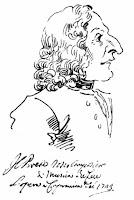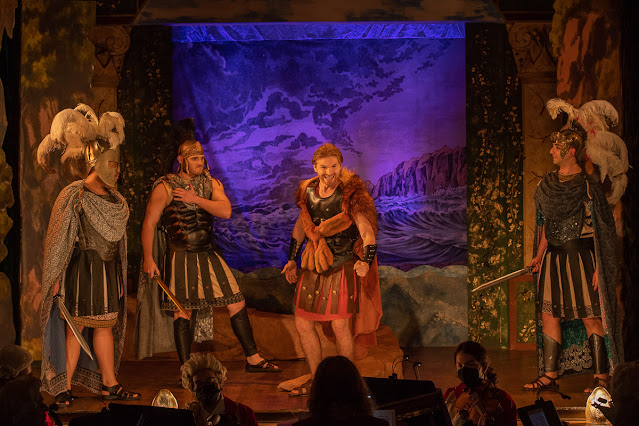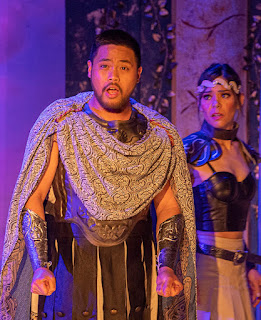 |
| The Amazon princess Ippolita (Janet Todd) sings of her new beloved, the Greek hero Teseo, in Pacific Opera Project's US premiere of Vivaldi's opera Ercole su’l Termodonte (1723). |
Vivaldi’s “Ercole su’l Termodonte,” Pacific Opera Project, Highland Park Ebell Club, Los Angeles
DAVID J BROWN
 |
| Caricature of Vivaldi (1678-1741) from 1723. |
This has a quite different plot from Antonio Vivaldi's somewhat earlier Ercole su'l Termodonte RV 710 (Hercules on the Thermodon, or more loosely but relevantly, Hercules and the Amazons), of which the ever-enterprising Pacific Opera Project gave the US premiere exactly 300 years to the month after Vivaldi first presented his 16th opera (or his 21st, or 8th—your pick, depending on source) in Rome’s Teatro Capranica.
 |
| Title-page of the published libretto. |
Enter POP’s enterprising Artistic Director Josh Shaw, who learned about Ercole before the pandemic and originally intended to mount a production of it in the company’s 2020 season. This was to be POP’s first venture into historically-informed Baroque opera performance, with staging, orchestral playing, and costuming as “authentic” as possible, but the ambition was only to be finally achieved three years later than planned.
 |
| The Greek heroes: l-r, Teseo (Kyle Tingzon), Alceste (Michael Skarke), Hercules (Logan Webber), Telemone (Manfred Ayana). |
Shaw’s practical approach (outlined in published and online interviews) was to pare down the work to around two hours’ running time, tailoring it to fit the Highland Park Ebell Club’s intimate space, made yet more so by its transformation into a 188-seat replica (left) of a typically horseshoe-shaped Baroque theater, with temporary scaffolding supporting three tiers of box seating on three sides, plus a line of balcony seats at the rear and four rows of stalls facing the small orchestra pit.
All-in-all, the arrangement achieved the desired immediacy, though patrons clambering and peering to find their designated seating pushed Saturday night's start time back by a quarter-hour or so and, seating once located, the temporary structure amplified chair-clomping as audience members shunted back and forth to get better sightlines for the action.
 |
| The only known portrait of Vivaldi, also dating from 1723. |
Ercole takes its plot from the Labors of Hercules, imposed as a penance on the hero for having killed his own family in a fit of madness. The ninth Labor was to acquire the queen of the Amazons’ girdle (which in Vivaldi’s and Salvi’s scenario becomes her sword) and in true Amazonian fashion the opening scene finds Queen Antiope, sonorously and indeed ferociously portrayed by mezzo-soprano and POP regular Meagan Martin, railing against the iniquities of men and vowing to protect her daughter Martesia (Véronique Filloux, soprano) from them.
 |
| l-r: Ippolita (Janet Todd), Antiope (Meagan Martin), Martesia (Véronique Filloux). |
Scene change to the heroes—Hercules (Logan Webber, tenor), Teseo (Kyle Tingzon, countertenor), Alceste (Michael Skarke, countertenor), and Telemone (Manfred Anaya, tenor)—vowing to achieve the quest, but martial valore rapidly succumbs to l’amore when Teseo rescues Antiope’s sister Ippolita (soprano Janet Todd, another POP stalwart) from a bear and the couple immediately fall in love.
 |
| Alceste (Michael Skarke) and Martesia (Véronique Filloux). |
Not for a moment is any of this meant to be taken seriously, at least in this production. The focus is firmly, and effectively, on the vocal prowess of the cast, who without exception navigated skillfully Vivaldi’s melismatic assault-course of a score, the many ABA-form arias being brief, tuneful, and varied enough to avoid any longueurs. If you like Vivaldi, you will love Ercole su'l Termodonte. If you find his chugging rhythms get a little relentless after a while, well...
The part of Hercules himself, despite being the titular hero of heroes, is not particularly large and mostly consists of him acting as enabler to the amorous entanglements, though he does rise to the role of reconciler-in-chief at the conclusion. On this night at least Mr. Webber’s singing, while agile, seemed somewhat tonally unfocused, as if the part lay a little beyond his natural range.
 |
| Teseo (Kyle Tingzon) and Ippolita (Janet Todd). |
Ercole su'l Termodonte is worth seeing for his contribution alone, but there was so much else to enjoy in this first thoroughgoing Baroque opera production by Pacific Opera Project. Let’s hope there are many more to come. Further performances take place on Thursday, January 12 (8:00 p.m.), Saturday January 14 (2:00 p.m. and 7:00 p.m.), Friday January 20 (8:00 p.m.), and Saturday January 21 (2:00 p.m. and 7:00 p.m.). Booking information is available here. Be there—but if you can't make it to the Ebell, the matinee on Saturday January 21 will be livestreamed on YouTube.
---ooo---
Pacific Opera Project, Highland Park Ebell Club, 131 S, Ave. 57, Los Angeles 90042, 7 p.m., Saturday, January 7, 2023.
Images: Production photos: Martha Benedict; Vivaldi: Wikimedia Commons.



No comments:
Post a Comment
Note: Only a member of this blog may post a comment.